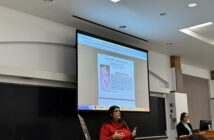“Compelling Perspectives” is a recently erected Lehigh-sponsored forum that brings speakers to engage with different worldly topics of “critical and societal importance.”
Theresa May, a former prime minister of the United Kingdom and current member of parliament, was brought to campus as part of the series to offer her perspective on national security in a global context.
Several members of The Brown and White Editorial Board attended both an intimate question-and-answer session led by Provost Nathan Urban and the publicly open discussion moderated by President Joseph Helble.
We were unimpressed by both.
The goals of Compelling Perspectives are virtuous and commendable — it’s worthwhile to promote critical thinking in the truest of senses, even, and especially, when we disagree.
And with that, let’s not allow a veil of impartiality to conceal our assessment that May was not a compelling perspective.
As an active politician, it’s hard to imagine she would say anything particularly controversial or self-critical. But May succeeded in the thing politicians are touted for doing: taking part of a question and transforming it into a part of the book she wrote.
For that we praise her. Her ability to speak with confidence and dignity is profound considering her legacy as prime minister is nothing short of chaotic.
May’s poor handling of Brexit and the holding of a snap election in 2017 are the most common failures pointed to in arguments about her weak leadership. In part due to the ensuing problems these events created, May resigned as prime minister in 2019.
Not to mention that conservatives in the U.K., the party she lays claims to, are responsible for pushing a nationalist agenda that has ultimately made the country less secure.
Brexit, which May initially opposed, was barely acknowledged in the conversation and there was no reconciliation with the fact that the European Union is less stable or cooperative since the U.K.’s departure.
Instead, the students were met with vague, grandiose statements about the importance of political balance and the willingness to compromise. But May herself is an isolated, unliked figure on both sides of the political aisle.
Absolutism, as she described in her main presentation, is currently overtaking societal discourse because it separates people as either being entirely with or against someone.
The word “absolutist” was brought into conversation five times throughout the night. The word “extremist” was mentioned only once.
While absolutism is the mechanism that perpetuates extremism, it’s an extremist right wing driving politics upside down all over the world. May’s disillusionment of the conservative party and willingness to appeal to various sides of it ended in disaster.
On the note of rhetoric, May drew emphasis on several odd talking points.
One was that there’s an important difference between refugees and economic migrants and that resources and policies should address them separately. Another was about the success of the Modern Slavery Act.
And an even stranger one was about internet safety in the era of social media where she recounted a story about meeting a father whose son committed suicide after being influenced by a website.
The night ended on a bitter note when several students at the end of the event used the Q&A forum to press May about the ongoing humanitarian crisis in Gaza.
May mostly aligned herself with the “Israel has a right to defend itself” mantra as a blanket response to the conflict and, though she supported a two-state solution, offered no real insight into how it would be possible.
Without a disruption to the status quo, an analytical eye toward current events or a willingness to stand by her own opinions, it was hard to see May as being all that compelling.
We see May as a flashy, British and controversial conservative on a book tour. We’re not sure she was even a fit to be discussing national security.
We agree that accounting for a variety of perspectives is valuable in provoking thought that extends well beyond the walls of Baker Hall, but we’re not sure May was the one to do that. But at least we started somewhere and beg for something more compelling here on out.






Comment policy
Comments posted to The Brown and White website are reviewed by a moderator before being approved. Incendiary speech or harassing language, including comments targeted at individuals, may be deemed unacceptable and not published. Spam and other soliciting will also be declined.
The Brown and White also reserves the right to not publish entirely anonymous comments.
3 Comments
Yes Teresa May was largely ineffective in her short term as Prime Minister.
Despite disclaimers by the editors I think the May talks were compelling. Had it been as worthless as we might have been led to believe there would not be so much for The Brown and White to carve up.
“The night ended on a bitter note when several students at the end of the event used the Q&A forum to press May about the ongoing humanitarian crisis in Gaza.
May mostly aligned herself with the “Israel has a right to defend itself” mantra as a blanket response to the conflict and, though she supported a two-state solution, offered no real insight into how it would be possible.”
The Brown and White needs to do a staff editorial on a solution to the “Israel” problem which is its existence and right to defend itself. There is also a Palestinian problem which is the right of the Palestinians to eliminate the Jews.
The two state solution is the preferred choice of many who want to be equitable towards two antagonistic peoples. The original 1947 proposal seemed to be equitable, having been based on private ownership of land by Jews and non Jews. It was rejected as have all subsequent two state solutions by Palestinians.
Past efforts of Israel’s neighbors have resulted in the expansion of Israel’s borders. Seemingly the neighbors have decided it is better to negotiate than fight. There is the Palestinian problem.
Hamas is a self proclaimed genocidal organization that controls Gaza; if they disappear humanitarian aid will flow from multiple sources.
What should our actions be with regard to a genocidal organization who pursues it’s aims in preference to humanitarian aid to the people it controls?
Not to mention that conservatives in the U.K., the party she lays claims to, are responsible for pushing a nationalist agenda that has ultimately made the country less secure.
Not unusual to se your bias front and center. And what is wrong with a Nationalist agenda? Afterall politicians get elected by citizens of the UK, so UK domestic interests SHOULD be front and center. The UK Globalist mind set has brought vast numbers of legal and illegal immigrants that don’t assimilate into society and culture which increases financial and social security risk. Witness the substantial increase in public demonstrations in support of the terrorist organizations Hamas. Additionally like here in the US, illegal immigration has swamped the the Government’s ability to financially house, cloth and feed the new mouths.
As for the Two State Solution – Hamas and the PLO have rejected offers. Hamas’ charter still calls for and teaches the destruction of Israel and the extermination of Jews. These are nota basis of establishing a reliable peace partner.
How does Hamas plan to live with Israel? They don’t.